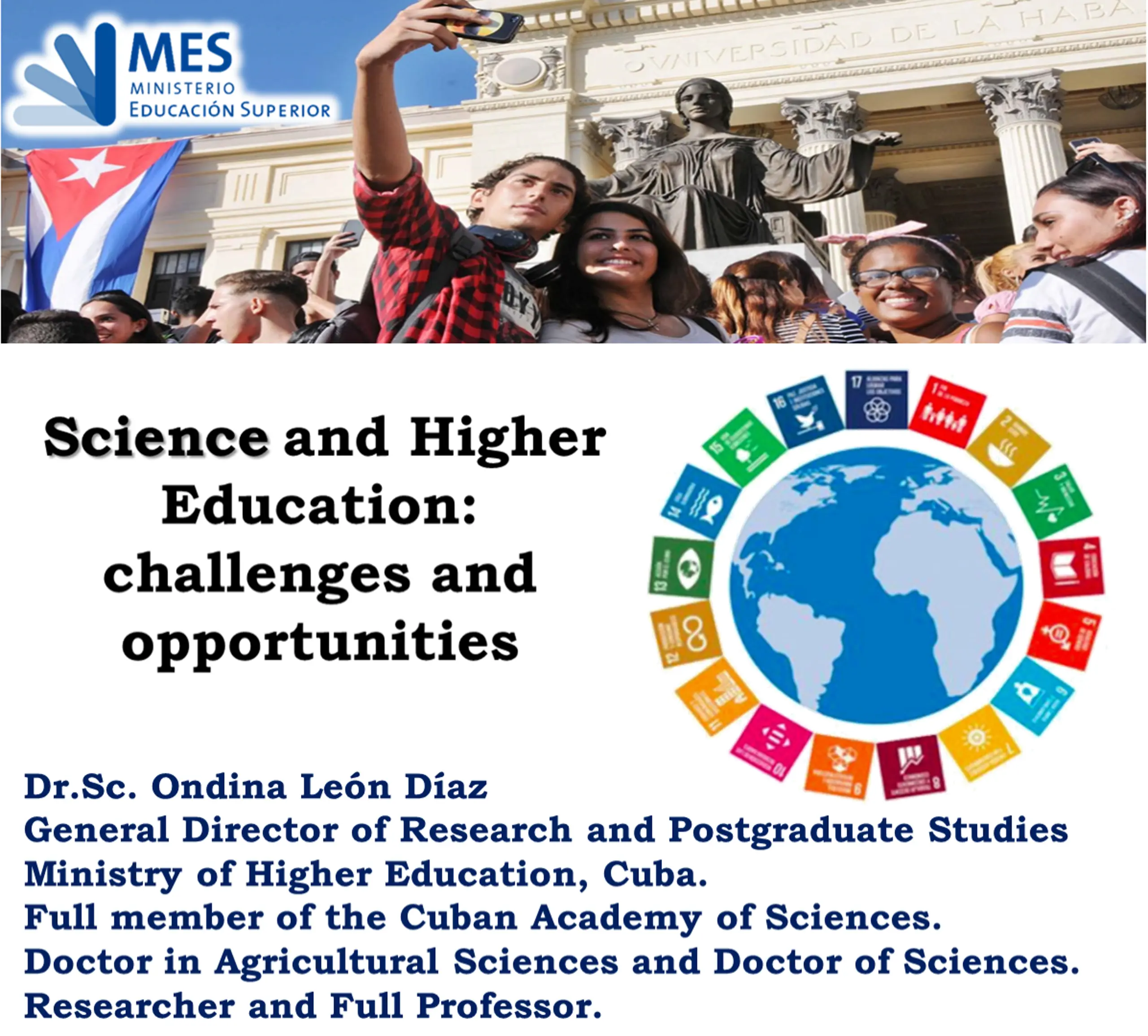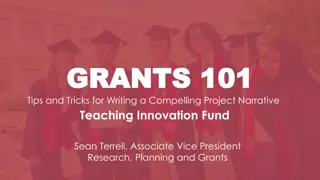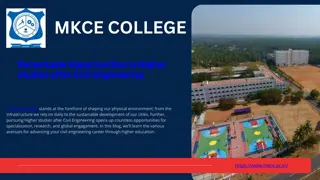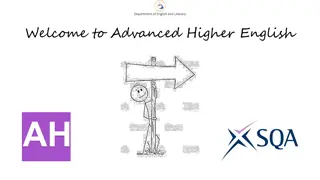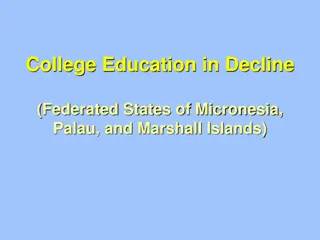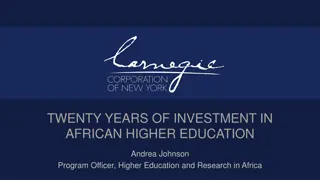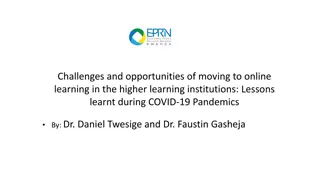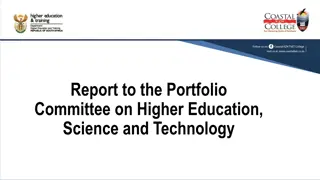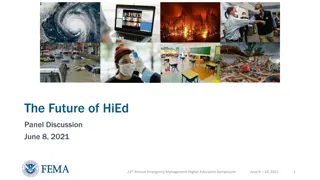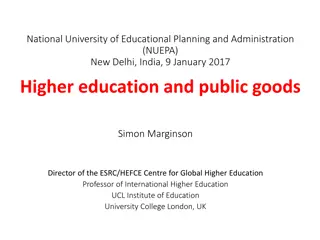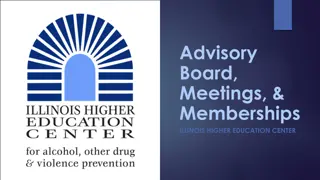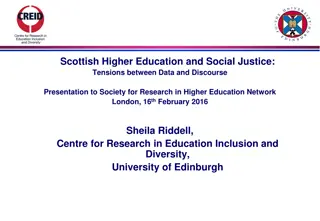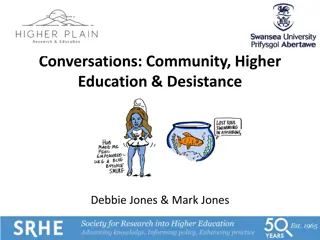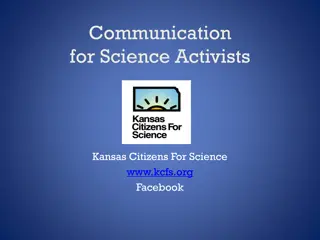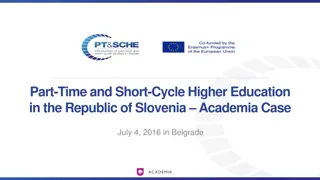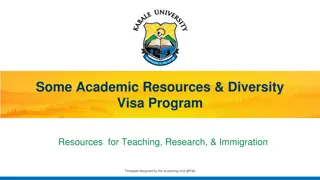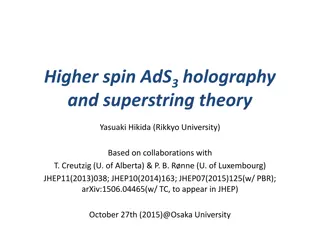Science and Higher Education: challenges and opportunities
The Cuban higher education system, including its institutions, programs, research centers, and postgraduate studies. Discover the expected impacts on society and the emphasis on innovation in university training.
Download Presentation

Please find below an Image/Link to download the presentation.
The content on the website is provided AS IS for your information and personal use only. It may not be sold, licensed, or shared on other websites without obtaining consent from the author.If you encounter any issues during the download, it is possible that the publisher has removed the file from their server.
You are allowed to download the files provided on this website for personal or commercial use, subject to the condition that they are used lawfully. All files are the property of their respective owners.
The content on the website is provided AS IS for your information and personal use only. It may not be sold, licensed, or shared on other websites without obtaining consent from the author.
E N D
Presentation Transcript
Dr.Sc. Ondina Len Daz General Director of Research and Postgraduate Studies Ministry of Higher Education, Cuba. Full member of the Cuban Academy of Sciences. Doctor in Agricultural Sciences and Doctor of Sciences. Researcher and Full Professor.
HIGHER EDUCATION A human and universal right " Education is a fundamental right that is the basis of the progress of any country." Higher education must be the responsibility of all governments. CMES 2009 Higher education is a social public good, a human and universal right and a duty of the State. CRES 2008/2018 Sustainable Development Goals (SDGs) 2015-2030
CUBAN HIGHER EDUCATION There are 50 institutions of Higher Education: 25 are from MES. There are 194,723 students in 112 majors and 58 senior technician programs. Enrolled: Daily Course: 126 681 Course by Meetings: 131 816 Distance Course: 11 328 There are 17 800 full-time and part-time teachers and 7 388 researchers. Doctors in Sciences 4 298 and 12 417 Master of Science. 61.4% of the staff has the higher teaching categories of full professors and associate teachers. About 35% are under the age of 35.
CUBAN HIGHER EDUCATION Research centers (CE), science, technology and innovation entities (ECTI) Research centers: 100 122 Municipal university centers (CUM) Science, Technology and Innovation Entities: 27 Dynamic structures of science: 10 (science and technology parks, interface enterprizes and foundations).
CUBAN HIGHER EDUCATION The following are taught in postgraduate studies: Courses, Diplomas, Trainings Postgraduate Specialities: 177 Masters Programs: 380 Doctoral Programs: 136
EXPECTED IMPACTS BY THE SOCIETY Generation of knowledge, creation of capacities, development and application of products, services and tecnologies to improve living conditions, substitution of imports and exports through R+D+I processes Training and upgrading of executives Contribution to territorial and local development Ongoing training of professionals Training for the profession Postgrauate training Connecting knowledge to the economy and society
INNOVATION IN THE PROCESS OF UNIVERSITY TRAINING Break with the traditional educational paradigm centered on the teacher and content for the transmission and reproduction of information. Student-centered with active learning didactic strategies that teach how to operate with information and transform it into knowledge. In the link of theory with practice. Research component: Curricular and extracurricular research. SOLUTIONS TO PROBLEMS
INTEGRATED MANAGEMENT OF TRAINING SCIENCE. TECHNOLOGY AND INNOVATION IMPACT DEVELOPMENT SOCIAL RELEVANCE I+D+i projects Doctorate programs Master programs Professional development Engineering and bachelors UNDERGRADUATE STUDENTS (CURRICULAR AND EXTRACURRICULAR RESEARCH)
SCIENCE, TECHNOLOGY AND INNOVATION STRENGTHENING SCIENCE, TECHNOLOGY, INNOVATION AND DOCTORAL TRAINING Strengthen the activity of science, technology, innovation, doctoral and postdoctoral training through the priority in the lines of research, the concentration of human, financial and material resources and the support of international relations; articulating it harmoniously with undergraduate and postgraduate training, to achieve sustainable impacts on the economy and society.
INTEGRATED MANAGMENT OF TRAINING SCIENCE, TECHNOLOGY AND INNOVATION Lines of research, priorities and interdisciplinary, transdisciplinary and multidisciplinary projects Postgraduate studies , doctoral programs and postdoctoral research linked to research lines and research projects International collaboration with institutions of excellence STRATEGIES Recognitions and awards to students, professors and researchers Relationship with the society and the socio-productive environment to enhance economic and social impacts Environment of debate and control, scientific criticism, rigor, high quality standards and ethical values
Economic and Social Development Plan (PNDES) until 2030. Macroprograms. Strategic axis of human potential and Science, Technology and Innovation (STI). Public policies of STI, undergraduate and postgraduate studies. Government system based on science and innovation, social communication and digitalization of society. Implementation of public policies at the territorial level and decentralization of competences. Strategic planning of the Ministry of Higher Education
SOME RESULTS A large number of experts are provided who participate with their knowledge in government decision making. More than 50% of the national awards of the Cuban Academy of Sciences and innovation are from MES staffs. More than 90 scientific journals in different areas of knowledge. Important production of books and softwares. Five national programs and one sectorial program of MES itself are managed. Wide range of training and postgraduate courses.
STRATEGIC SECTORS Electroenerge tics ICTs Construction Transport logistics, storage and trade Logistics of hydraulic networks and installations Tourism Pharmaceutical, biotechnological, and biomedical industry Professional technical services Food SUGAR Light industry AGROINDUSTRY
INTERNACIONALIZATION/SUSTAINABLE DEVELOPMENT International cooperation that promotes development. Estados Unidos Rusia China Management of international cooperation projects, scholarships and research stays on strategic issues that pay tribute to doctorates. Angola, Etiop a, Mozambique, Guinea Ecuatorial, Zimbabwe, Sahara Occidental, Swazilandia Increase income gains. . .
CONCLUSIONS The social commitment is concretized in the impact of the university activity in the social, economic and cultural life of the community into which it is integrated, with a singular identity vision without ever losing the perspective of universality. A committed, relevant and socially responsible higher education must contribute to the knowledge and solution, in its field and in accordance with its possibilities, of the problems and needs of society with the different actors. We advocate for a model of scientific, technological, humanistic and innovative university, committed to its people, with its time, solidarity and internationalist. A university to which scientific research and postgraduate research is inherent, the dissemination of results, one which brings its knowledge to the people, of which it is part and learns (Diaz Canel, 2016).
CONCLUSIONS Higher education institutions are called upon to contribute, through the integration of their processes, to the country's development agenda and to the sustainable development goals. The improvement of the Science, Technology and Innovation System is a requirement of first order to fulfill the social mandate of the university and ensure its sustainability. The University, in a phase of institutional maturity, has the potential to assume and overcome the challenges imposed by the humanistic, scientific, technological and innovative university model; integrated into society, and deeply committed to the sustainability of the world in which we live. Only creativity and innovation in the management of the university processes ensures the sustainability, relevance and advancement of higher education.
MAIN CHALLENGES Continue: Strengthening connections with society and the economy. Further expanding access to higher education and motivation and capacity building for science and innovation. Fostering interest in basic sciences. Promoting the sector of high technological intensity. Providing new dynamic structures of science: start up, joint laboratories, accelerators, small and medium-sized enterprizes, among others. Strengthening the connection of higher education with territorial development. Strengthening internationalization.
International International Congress Congress 2024 on on Higher Higher XIV Education,Universidad Education,Universidad 2024 Higher Higher Education Education of transformation transformation, , sustainability sustainability of the quality quality, , the Future Future: : social relevance relevance social and and The Higher Education Institutions are inviting you to participate, from February 5 to 9, in the XIV International Congress on Higher Education University 2024, at the International Conventions Center in Havana, Cuba in order tocontinue a dialogue and a reflection on its role in social and economic transformation, based on the principles of quality, sustainability and its relevance.
CUBAN HIGHER EDUCATION Need for the harmonious integration of the economic, social, environmental and cultural vision of development and enhance ourselves as an innovative university, for greater interdisciplinary integration and university processes of training, research and extension, with a high relevance in function of the sustainable and inclusive development of our countries Dr.C. Jos Ram n Saborido, Minister of Higher education
